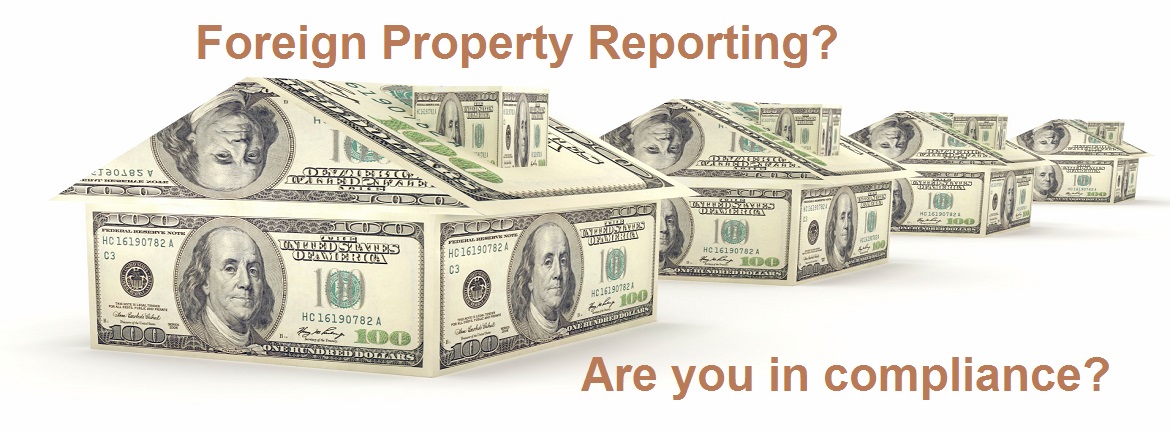Do You Have to File Foreign Property Reporting (Form T1135)?
Individuals who are residents of Canada are taxable on their worldwide income. To ensure all Canadian residents correctly report their worldwide income, the tax law requires Canadian residents annually file with the CRA the Form T1135 Foreign Income Verification Statement (commonly referred to as foreign property reporting) if they own, at any time during a year, “specified foreign property” with a total cost of more than $100,000 Canadian dollars. Generally speaking, specified foreign property includes funds or investments situated, deposited or held outside of Canada; debts receivable from or shares of non-resident corporations; real estate property, life insurance policy issued by a foreign issuer and interest in a non-resident trust.
The T1135 filing due-date for individuals, corporations and trusts is the same date as their income tax return. For partnerships, the T1135 filing due date is the same date as their partnership information return. This foreign property reporting requirement applies even if the taxpayer has no tax payable for the year. The penalties for failing to file a Form T1135 range from $25 per day (with a minimum $100 penalty) to a maximum of $2,500. In case of gross negligence, false statements or omissions, the penalty is the greater of either $24,000 or 5% of the cost of the foreign property.
Recent Changes in Foreign Property Reporting
The information required to be disclosed in Form T1135 for 2012 and prior years did not provide any meaningful or useful information for the CRA to verify if the taxpayers have correctly reported all their foreign income in their annual income tax returns. In the 2013 Federal Budget, the Federal government publicly acknowledged that Canada has a significant ongoing problem in aggressive international tax evasion and avoidance using offshore accounts. To strengthen the CRA’s ability to detect and combat international aggressive tax evasion and avoidance, the following two changes relating to the foreign property reporting were implemented starting with the 2013 taxation year:
- Extending the normal reassessment period of a taxpayer by three years if the taxpayer has failed to report income from a specified foreign property on their annual income tax return and Form T1135 was not filed, late-filed or included incorrect information concerning the foreign property. Thus, if the taxpayer is an individual, the CRA will have six years (from the day a notice of an original assessment is sent to the individual taxpayer) to find the unreported foreign income and reassess that individual taxpayer’s worldwide income. Nevertheless, the CRA has almost unlimited time to assess tax and penalties if failure to report the foreign income was due to fraud, misrepresentation or gross negligence.
- Revising Form T1135 to include more detailed information requirements for each category of specified foreign property, including the name of the specific foreign institution or other entity holding funds outside of Canada, the country where the specific offshore asset is located; and the foreign income generated from the foreign property. The objective of these revisions is to provide more detailed information to the CRA for better targeting international tax evasion and aggressive tax avoidance.
Other Measures for the CRA to Combat International Tax Evasion and Aggressive Tax Avoidance
The CRA are also empowered with the following two new tools to better target international tax evasion and aggressive tax avoidance:
- International Electronic Funds Transfer: Starting in 2015, certain financial intermediaries including banks must report international electronic funds transfers (EFTs) of $10,000 or more to the CRA for use in the administration of the Canadian tax law.
- Offshore Tax Informant Program (OTIP): Starting from 2013, the CRA offers a financial reward to individuals who provide information related to major international tax non-compliance that leads to the collection of federal taxes owing of more than $100,000.
A Second Chance to Correct Your Tax Affairs
If you unknowingly failed to report foreign income and/or file the T1135 for previous tax years, we can assist you to determine if you may qualify to make disclosures under the CRA’s Voluntary Disclosure Program (VDP) to correct inaccurate or incomplete information. If the VDP disclosure is accepted by the CRA, you will not be charged penalties or prosecuted with respect to the disclosure. You still have to pay the taxes owing with compounded interest. But you may be granted partial relief of interest charged on taxes owing.
WE CAN HELP
We are a Toronto Chartered Accountant firm with 20 years of specialized experience in Canadian domestic and international taxation. We can assist with
- Cross border taxation;
- Business and succession planning;
- Canadian personal and corporate tax returns;
- Corporate tax planning and reorganization;
- Retirement planning;
- Estate planning and inheritance tax advice; and
- Tax audit dispute and resolution.
Ccontact us to schedule an appointment.
_________________________________
The information in this article is general in nature and does not constitute professional advice. We recommend that you obtain the appropriate professional advice before acting on any of the information contained herein.






